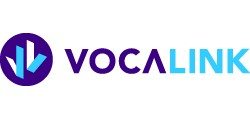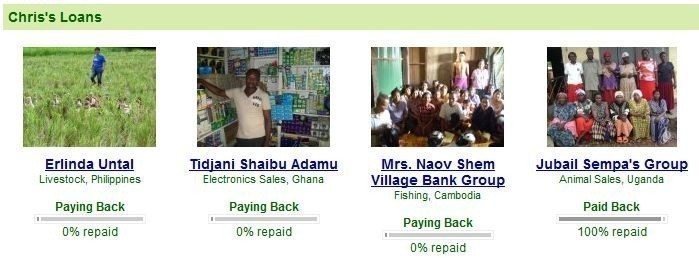
For those of you who haven't heard of Kiva, it's a P2P lending community with a difference. It's the Grameen Bank of the Zopa world. In other words, it facilitates microfinance, using the web as an enabler. And it's wonderful.
Why is it wonderful?
OK. It starts with that fact that it connects people with money to those without.
I joined Kiva a while ago and put $100 in, just to see what happened. The investment was split into $25 chunks across four borrowers in four countries. Since then, I've been recycling the $100 amongst different communities and here's some of my recent investments:

These are shown on my profile picture and comprise a range of countries and projects, from buying livestock to running a store. .
As you can see, three haven't repaid yet, but then I only invested in them this week. Meanwhile, Jubail Sempa is typical of my $25 per project investment - repaid in full in.
On a regular basis, Kiva updates me with the progress of the loans made. For example, I made the first three loans yesterday and got this email today:
Thank you for your loan. It has been disbursed to Tidjani Shaibu Adamu by Christian Rural Aid Network (CRAN) in Ghana. We are excited to watch this business grow. Over the 7 months of this loan, Christian Rural Aid Network (CRAN) will be collecting repayments from this entrepreneur and posting progress updates on the Kiva website.
This update was posted by CRAN, who are Kiva's partner in Ghana.
Meanwhile, where a loan has been repaid, such as Jubail Sempa's Group above, then you get a full profile and update of the project.
So here's Jubail's project:
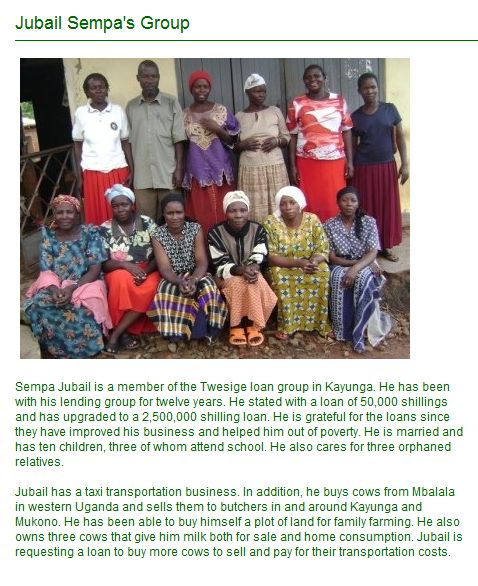
The loans have "helped him out of poverty". There's the point. Using the concepts of microfinance created by Muhammad Yunus, who received the nobel peace prize for creating Grameen Bank, Kiva has taken this concept into the 21st century.
The organisation runs a network based in the USA, with local agents managing the distribution and collection of money. As a result, there's a human connectivity here which is why most loans are repaid fast.
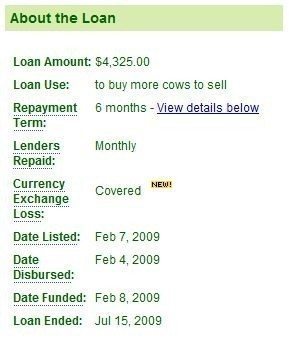
As you can see, Jubail's group wanted $4,325 in February to buy more cows, and paid back early.
This is usual.
The nice thing about Kiva is that it's social too. You not only feel connected to your remote investment, but also with the other investors.
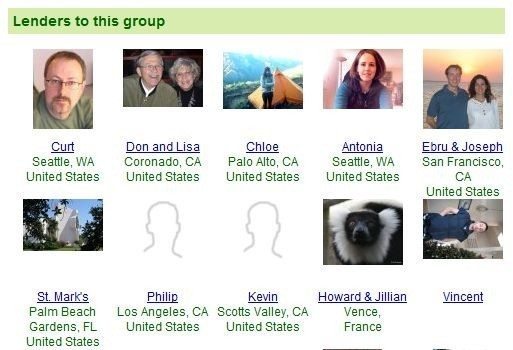
All in all, it's a brilliant concept run by fantastic people and improves the world. And there's not many financial services companies you can say that about these days is there?
This is why people like Bill Clinton give them praise:
And there's another reason Kiva is important for you to be aware of. They're now moving into the mainstream.
Early in June for example, they started microfinance for ... Americans. Their blog gives a review of what's happened, and the slides are interesting:
I took particular note of the outcome of their move into microlending in the USA:
The Kiva Board had a lot of questions given the significant amount of both criticism and support of the U.S. pilot from the Kiva lender community. After a lengthy discussion, we’ve decided 3 things:
1. Based on overwhelming feedback that Kiva is about giving people choice, Kiva should continue to give our members the choice to make loans to U.S. entrepreneurs.
2. We've received tons of feedback regarding the perceived poverty level of certain borrowers who were part of the U.S. launch. Kiva intends to sit down with our U.S. based Field Partners and share this feedback so that they can post loans that align more closely with Kiva's poverty alleviating mission.
3. As we consider future opportunities to expand within the U.S., we will exercise caution and keep the ongoing feedback of the Kiva lender community in mind.
Funnily enough, this reflects the fact that the Kiva community like the idea of helping Cambodia, Uganda, Nigeria and other under developed economies, but many don't like the idea of people with money giving to economies where people have money ... the USA in other words.
The trouble is, these days, many in developed economies also need money and so Kiva has said that if Americans want to give to Americans, so be it. I wonder if they'll give to Glaswegians, as Muhammad Yunus thinks that's a good target?
Meanwhile, if you have ten minutes, it's well worth spending the time watching this movie: the story of a Kiva loan.
A Fistful Of Dollars: The Story of a Kiva.org Loan from Kieran Ball on Vimeo.
Chris M Skinner
Chris Skinner is best known as an independent commentator on the financial markets through his blog, TheFinanser.com, as author of the bestselling book Digital Bank, and Chair of the European networking forum the Financial Services Club. He has been voted one of the most influential people in banking by The Financial Brand (as well as one of the best blogs), a FinTech Titan (Next Bank), one of the Fintech Leaders you need to follow (City AM, Deluxe and Jax Finance), as well as one of the Top 40 most influential people in financial technology by the Wall Street Journal's Financial News. To learn more click here...


